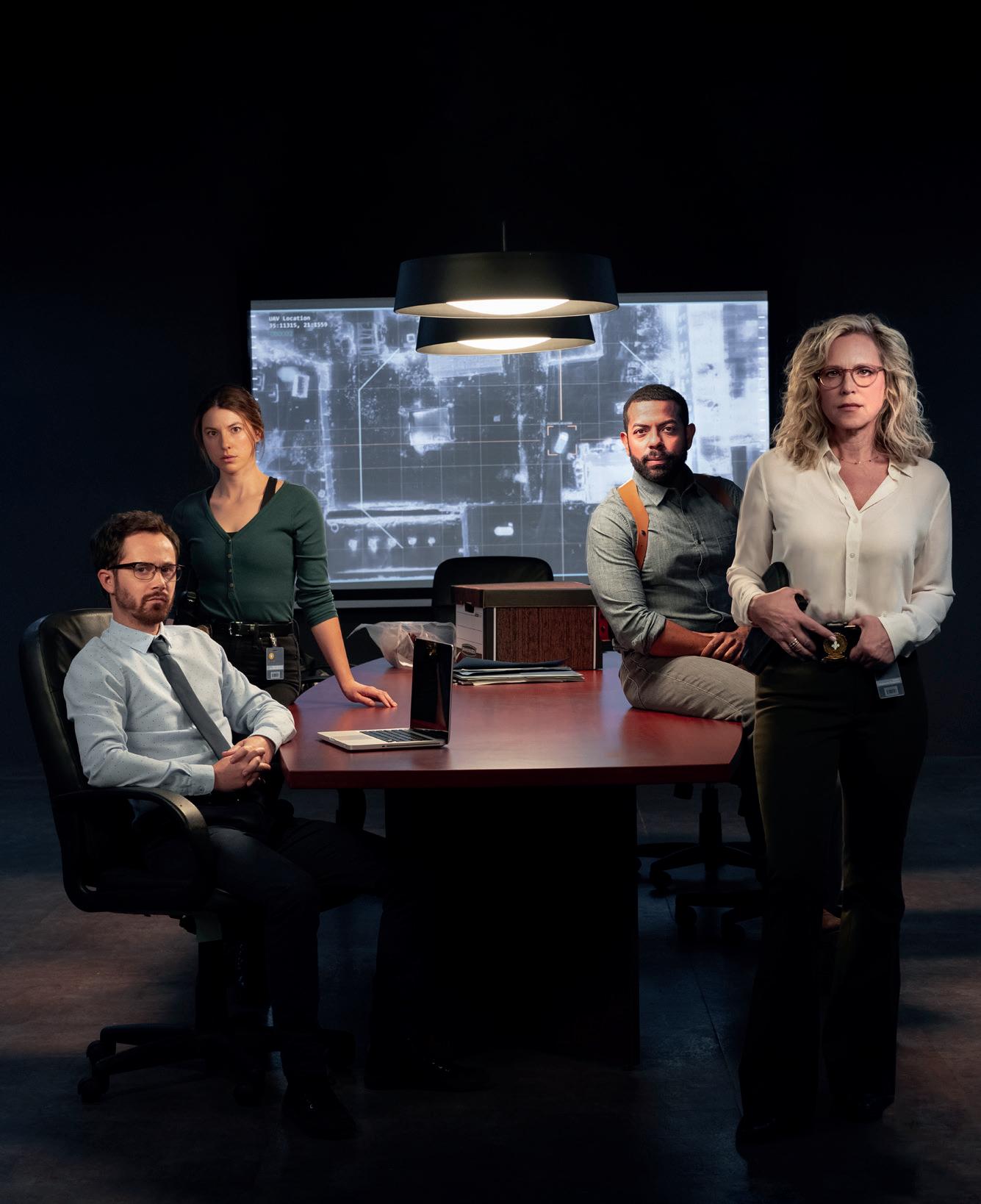



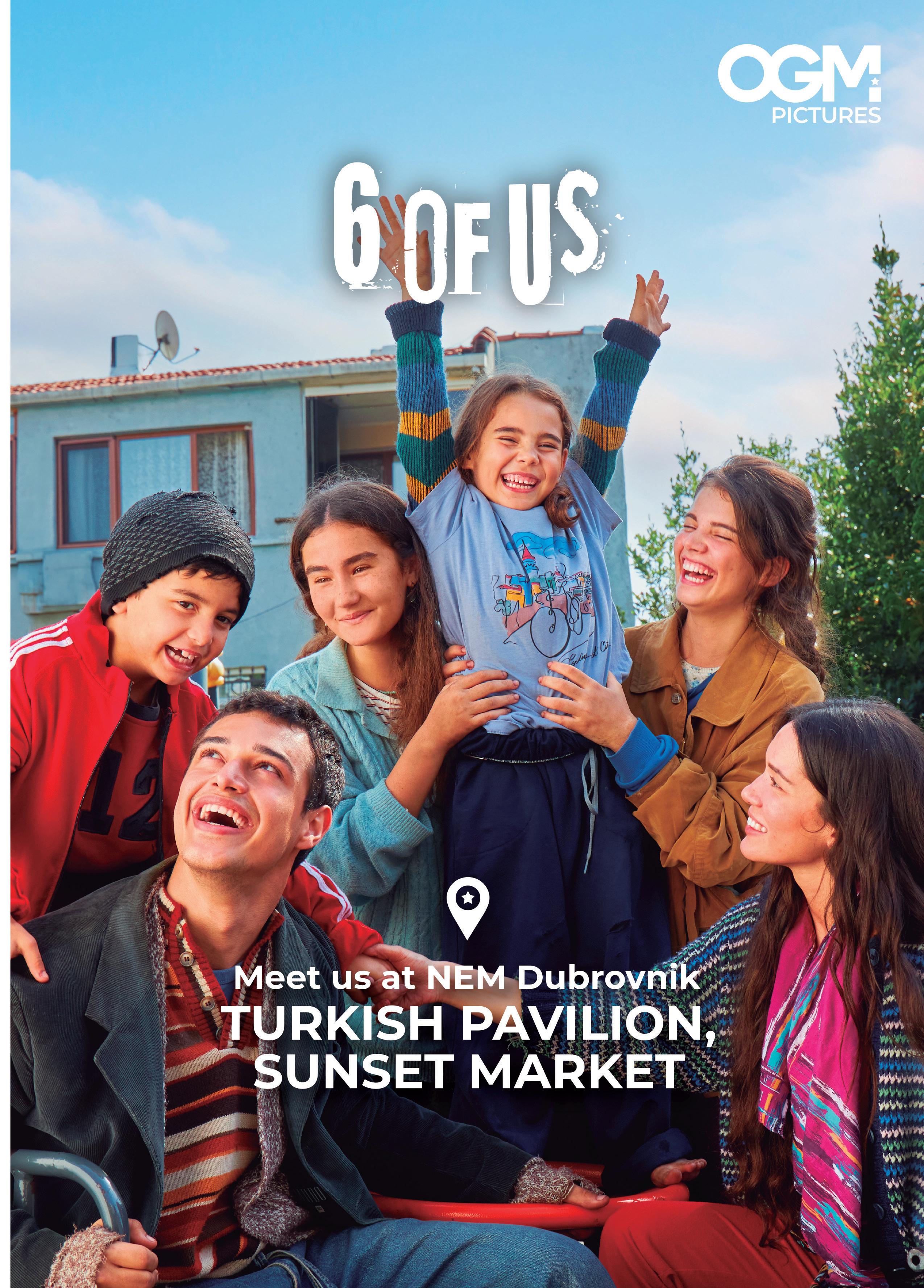








38%
YOUTUBE IS SOLIDIFYING AS A MAJOR PLAYER IN THE LONG-FORM CONTENT SPACE, WITH 38% OF ITS GLOBAL MONTHLY USERS WATCHING TRADITIONAL TV AND FILM CONTENT.
84%
OF INTERNET USERS ACCESS YOUTUBE PLATFORM MONTHLY, 73% WEEKLY, AND 59% DAILY.
5
DOCS, TV SHOWS, AND FILMS NOW RANK AMONG YOUTUBE’S TOP FIVE MOST-WATCHED CONTENT TYPES.
Regional differences in viewing patterns highlight the global opportunity. In Asia Pacific, 45% of YouTube users report watching traditional TV and film content on the platform. In Latin America, the figure is 40%, in North America the average is 37%, and Western Europe trails behind, with 28%.

Channel 4 has announced a significant transformation in its commissioning and production strategy, unveiling a twintrack approach that combines in-house content production under a new brand, Channel 4 Studios, with a revised model for independent producers focused on shared IP ownership. The strategic pivot is designed to bolster the broadcaster’s long-term sustainability, increase commercial returns, and future-proof its unique publisher-broadcaster model. •


Globalsphere, MediaHub’s affiliated production company in partnership with Geophil, appointed Eliz Arkayın-Ungan as its new Director of Drama. With over 15 years of experience, Arkayın-Ungan brings a strong background in content development, scriptwriting, and production. Ungan will lead Globalsphere’s upcoming original productions, shaping the company’s drama slate with her industry expertise. •
C alinos Entertainment has added the second season of the acclaimed Turkish drama “Deeply” (“İlk ve Son”) to its international distribution catalog. Produced by Ortaks and originally streamed on BluTV, both seasons of the emotionally charged series are now also available on Max. The expansion into Calinos’ slate positions “Deeply” for broader global reach, underscoring the growing international demand for high-quality, character-driven storytelling from Turkey. The second season of “Deeply” continues to follow the evolving relationship between Nilüfer and Cihan, whose journey began with a chance encounter on a beach in Çeşme in 2014. •
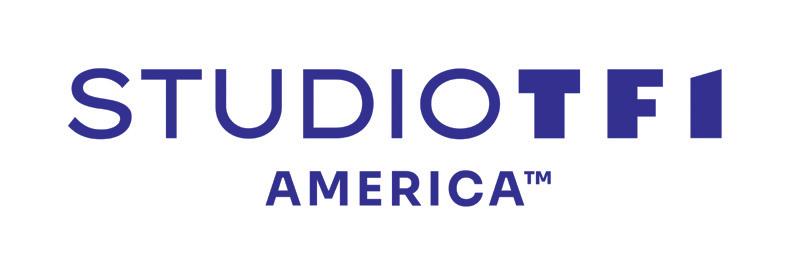
Joh nson Production Group and Reel One Entertainment announced their new corporate identity as Studio TF1 America, marking the beginning of a new phase following last year’s integration. The announcement was made by Timothy Johnson, Managing Director of Studio TF1 America, and represents a significant expansion in English-language content production. The initiative, partnership between TF1 and A+E Global Media, drives the production of premium TV movies and series in response to growing demand from major networks and streaming platforms. •
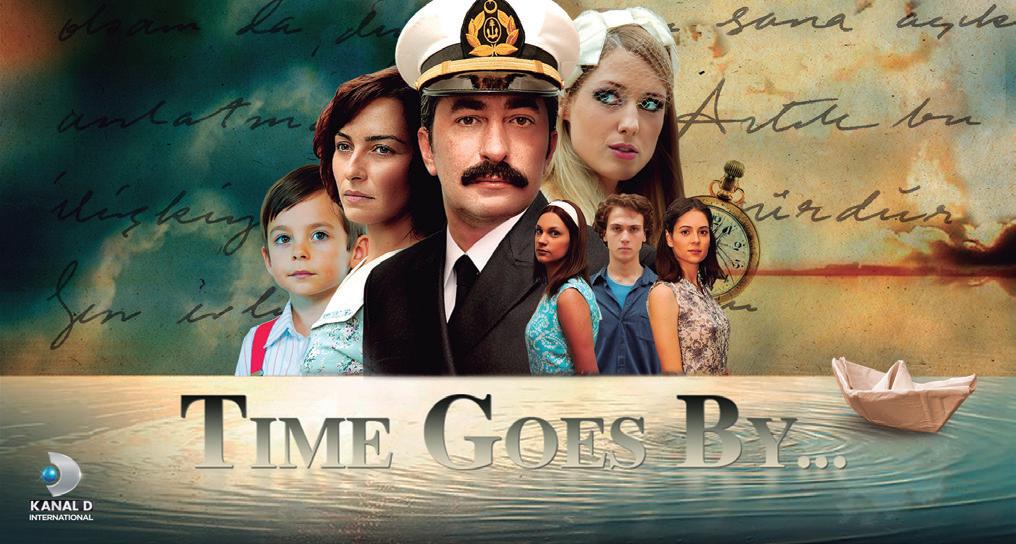
Kanal D International confirmed that the Turkish drama “Time Goes By” (Öyle Bir Geçer Zaman ki) will soon air in Serbia. A modern classic of Turkish television, the series captivated millions with its emotionally rich narrative, spanning decades of love, loss, and resilience within a single family. Moreover, the Turkish company sold two Turkish dramas, “Sweet Revenge” (“Tatlı İntikam”) and “Love of My Life” (“Hayatımın Aşkı”), in Croatia. Finally, Kanal D International confirmed that the Turkish drama “Farewell Letter” (“Veda Mektubu”) will soon debut in Estonia, continuing its international rollout. •
BossaNova Media has announced the global launch of “Secrets of Flying Scotsman,” produced by Argonon-owned BriteSpark Films. The title tells the story of the world’s most famous steam locomotive. The premium two-part documentary is produced for the international market with the series prebought by Channel 4 and SBS Australia. “Secrets of Flying Scotsman” follows the successful funding model pioneered by BriteSpark’s “Tsunami: The Day The Wave Hit,” which was also pre-sold to Channel 4 UK and SBS Australia earlier this year. The documentary has been acquired by TVNZ, Viasat, SVT Sweden and Radio Canada. •


Turkey’s distribution company Inter Medya licensed “Heartstrings” to Romania. First unveiled at Content Americas last January, “Heartstrings” continues to attract strong international interest, with sales momentum growing steadily. This latest deal marks another milestone for the series as it expands its global footprint. “Heartstrings” is a powerful drama about two parents whose lives are upended when they discover their daughters were switched at birth. Brought together by a desperate need to save a child’s life, Mahinur and Aras enter a marriage of necessity—only to find love where they least expected it. •
THE FINANCIAL INTEREST IN SYNDICATION RULES WERE SCRAPPED IN 1993 BUT JON VOIGHT’S PROPOSALS SUGGESTED REVIVING THEM TO ENCOURAGE
DIVERSITY IN PRODUCTION. IF THAT HAPPENS, THE IMPACT ON MEDIA COMPANIES WOULD BE IMMENSE.
The fin-syn (financial interest in syndication) rules banning broadcasters from owning an interest in their program suppliers were scrapped in 1993 and appeared to be a thing of the past until Jon Voight’s proposals for saving the US film industry were revealed last month. Among other things, Voight suggested reviving fin-syn to encourage greater diversity in film and TV production. If this happens, the impact on the biggest media companies would be immense. Since the demise of fin-syn, Hollywood studios have pivoted towards operating broadcast and cable TV networks.
Omdia’s Digital Content & Channels team tracks the quarterly reports of key US studios from Comcast, Paramount, Sony Pictures, Walt Disney and Warner Bros Discovery and the “mini-major” Lionsgate. For these six leading groups (Amazon MGM does not report financials), media networks revenues totalled $125.9 billion in 2024, more than three times as much as studios revenues, which totalled $39.2 billion.
The rollout of D2C services has been a costly and loss-making activity, but most studios are expecting to see their D2C divisions move into profit in 2025. Linear networks are, in contrast, declining. Comcast is planning to spin off most of its cable networks this year. Other restructuring moves may follow, including Warner Bros. Discovery and Paramount, which both wrote down the value of their networks last year. Lionsgate also separated its pay TV network Starz, acquired in 2016.
The change in the revenue mix of the studios does not mean they will exit film and TV production altogether, as their movie and film divisions are vital in creating new content which cycles onto their D2C platforms, often in exclusive windows. Sony, which opted not to launch its own D2C platform, has seen growth in its licensing revenues as it has been able to sell its content to multiple players, including Netflix.
In 2024, these six groups reported $39.2 bullion from studio divisions. In 2020, revenues were $36.8 billion; they have grown by 1.6%. Revenues from media networks (linear channels and direct-to-consumer platforms) totalled $125.9 billion, more than three times as much as studios revenues. Media networks revenues increased by 10% over the last five years.
Over the last five years, the four studios that do report D2C had a combined 23.5% increase in revenues to $46.9 billion in 2024. Overall media networks revenues for these four groups increased 10.2%. While the studios have come under fire from some shareholders for the losses racked up by their move into direct-to-consumer, the much stronger revenue performance suggests the strategy was necessary. Linear channel revenues were also hit by the COVID crisis in 2020/21 while D2C benefited.
Walt Disney reports its networks in three segments: linear networks, D2C, and sports. All three combined increased revenues by 3.2% over the last three years, easily outperforming its peers. A 4.2% decline in linear networks revenues was offset by a 12.6% gain in D2C revenues, mainly driven by Hulu in the US and Disney+ worldwide. Although Disney appears to have shelved plans to sell off its linear networks, it has done other restructuring. Star India merged with Reliance Industries and deconsolidated. In the US, Disney has dropped its plan to launch Venu Sports with Fox and WBD and will instead take a 70% stake in Fubo TV.
Paramount and Warner Bros Discovery both took a significant charge on their linear networks in the second quarter of 2025. Following a restructure completed at the beginning of the year, Warner Bros Discovery is expected to take further actions to bolster its networks business. D2C revenues were up 5.2% over the last three years, and the continuing international rollout of Max should improve the results of media networks, which were down 8.6%.
Paramount is in the process of a sale to SkyDance Media. The performance of Paramount’s media networks division was also worse than its peers, with revenues down 5% over the last three years. Paramount’s linear cable networks have been particularly badly hit by cord-cutting.
By Tim Westcott,

The CEE region shares many similarities and trends in terms of content development, but often with a different context and approach. Señal News spoke with leaders from the Czech Republic, Hungary, Poland, Romania, Lithuania, Slovakia, and Slovenia to gain insight into the future of an evolving and dynamic industry.

CEO, PAPRIKA STUDIOS
s we closely watch and also experience the market in eight countries of the CEE region, there are many similarities in the challenges but very different solutions to overcome them. We can see content budgets shrinking, but the number of hours to fill with content remains steady. That means that producers need to find more effective solutions to maintain the quality of the content. In addition, there is greater uncertainty in the surroundings, as well as within the industry itself, which puts commissioners and decision-makers in a significantly more challenging situation. Generally, this works against bold decisions and instead leaves us with the less-exciting, yet safer, choices, but not necessarily. I always emphasize that the more challenging it is, the more opportunities you have, especially if you are a passionate, trustworthy professional with the right skills and commitment. So, for those of you (or maybe us), it's getting more exciting.”
KEY PLAYERS FROM THE CZECH REPUBLIC, HUNGARY, POLAND, ROMANIA, LITHUANIA, SLOVAKIA, AND SLOVENIA DESCRIBE THE TRENDS OF EACH LOCAL MARKET AND HIGHLIGHT THE POTENTIAL OF THE REGION FOR GLOBAL PLAYERS.

PRODUCER,
PAPRIKA
STUDIOS CZECHIA
or most local commissioners, we observe a strong appetite for fiction content on the Czech market. We're in the middle of a pretty exciting moment in the Czech TV world. Things are changing; streaming is booming, audiences are far more selective, and the old ways of making TV are no longer necessary to work. As producers, we're being pushed, in a good way, to move beyond the safe, formulaic formats and create shows that are more ambitious, both narratively and visually. Stories that can stand alongside international content and still feel distinctly our own. Even public broadcasters like Czech TV are evolving slowly but surely. They're beginning to take risks on younger, fresher voices and edgier formats while still trying to keep that general appeal. It's a tricky balance, but you can feel the shift happening. A good example is that local players, such as Oneplay (Nova Group and O2), are investing heavily in original scripted

series and challenging the dominance of traditional networks. That's shaking up the entire local industry. We have real competition and more opportunities to tell stories that wouldn't have flown a few years ago. The bar's higher, the formats are looser, and the audience is smarter. Honestly, that's what makes it exciting.”
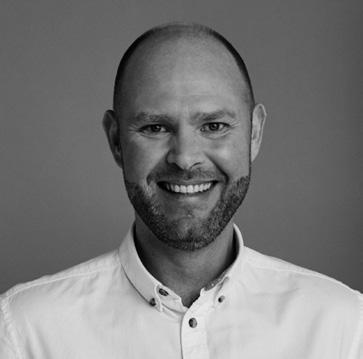
HEAD OF ENTERTAINMENT PRODUCTION, PAPRIKA STUDIOS HUNGARY
see the Hungarian TV industry in a highly adaptive and opportunity-rich phase. While traditional broadcasters, such as RTL and TV2, still lead the linear space, the growing presence of streaming platforms, including local players like RTL+, is reshaping viewing habits and commissioning strategies. A key trend is the demand for scalable, cost-effective formats that enable high-volume production and foster strong audience engagement. One successful example is the most recent season of 'Való Világ' ('Big Brother' type of reality), produced by Paprika Studios for RTL+, which significantly boosted subscriptions by targeting younger viewers with bingeworthy, daily content. At the same time, premium

HEAD OF PAPRIKA STUDIOS POLAND
V content production in Poland is evolving rapidly and can sometimes feel turbulent. Yet, the key point is that it's not standing still. This year, I've noticed a clear trend toward remakes of beloved films and series. It's a natural response; when the present feels too complex to capture, creators often look back to reimagine stories from the past with a hopefully fresh perspective."

“TVERONIKA JAKUBČOVÁ PRODUCER, PAPRIKA STUDIOS SLOVAKIA
reality formats like 'Árulók – Gyilkosság a kastélyban' ('The Traitors' Hungary) have brought new audiences, especially those who had previously chosen streamingonly content, back to linear television. These viewers, often in higher purchasing-power demographics, are now engaging with live broadcasts and social conversation around TV events. This dual-platform strategy is shaping the industry's overall direction, from hybrid development models to faster content cycles and greater format versatility. At Paprika Studios, we focus on blending creativity with agility to meet the evolving needs of both broadcasters and audiences in Hungary's unique media landscape."
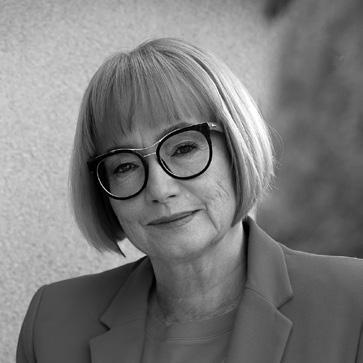
HEAD OF NON-FICTION
PRODUCTION, PAPRIKA STUDIOS POLAND
olish television is currently at an interesting crossroads. Traditional broadcasting still has its loyal audience, but streaming platforms are increasingly shaping how we watch and choose content. It is encouraging to see growing confidence in local productions. Creators are bolder, experimenting more with form and storytelling, and viewers are responding positively to stories rooted in our own culture. When it comes to entertainment and reality formats, a noticeable balance is evident: on the one hand, familiar formats are making a comeback, evoking a sense of nostalgia; on the other hand, new ideas are emerging to meet the expectations of a younger, more discerning audience. Authenticity and emotional resonance are what matter most today, regardless of whether the format is classic or entirely new. Overall, it feels like an industry that respects its roots while staying open to change, which is a healthy direction for the future.”
he most exciting trend in the Slovak television production landscape is the increasing focus on high-profile fiction productions, which is led by the leading private broadcaster, TV Markiza, with the rest of the broadcasters following suit. The pursuit of high-quality storytelling and production value is yielding success for both locally developed original series and adaptations of wellknown international formats.”

“WANCA IUREA OPERATIONS OFFICER PAPRIKA ROMANIA
e're pleased to see the growing interest from international broadcasters in locally produced content from Romania. A great example is 'Oamenii Legii' for AXN, alongside the two successful seasons, with a third on the way, of 'Vânătorii de Comori' for History Channel, a self-developed format that has performed around 50% above the slot average. These collaborations give us confidence that more international broadcasters and streamers will begin commissioning original local content in Romania. We're also encouraged by the increasing presence of major international formats in the Romanian market. Shows like 'The Traitors' are gaining traction, and it's clear that Romanian audiences are increasingly open to such content. Another area with strong growth potential is production services. Since the beginning of the year, we've received multiple inquiries from companies interested in filming in Romania. We're proud to offer not only a highly skilled professional team but also a stunning and versatile filming environment, ready to support any format, from reality shows to scripted series.”
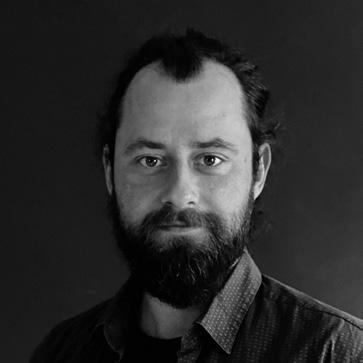

OFFICE MANAGER, PAPRIKA STUDIOS LITHUANIA
V remains a vital way to spend time in Lithuania. On average, Lithuanians spend between 3 and 4 hours daily in front of the TV. The trends in television markets are challenging. The main changes are reflected in the country's television advertising market. A significant decline in demand has been evident since the summer of 2024, and for the first time in many years, TV channels have not sold all of their advertising space. Paprika Lithuania's shows have focused on producing content for the public broadcaster, which is less affected by commercial influence in its primary focus. Our most notable contribution is 'Gime ta Pacia Diena,' a non-scripted series that was re-commissioned for seven seasons. The format tells the life stories of three individuals, all born on the same date. The series explores their personal stories, backgrounds, achievements, and challenges and links their fates to significant and lesserknown events in Lithuanian and World history. In addition to television production, we specialize in film production services in Lithuania, with notable projects including 'Kalevala' and 'Villain of Villains.' We have a market that, after a turbulent period, has significant potential to bounce back, with various productions showing interest in collaborating with Paprika Lithuania for Fall 2025.”
CREATIVE DIRECTOR FICTION, PAPRIKA
STUDIOS SLOVENIA
lovenia is like an unpolished diamond tucked between Central and Eastern Europe, fully belonging to neither. We have the talent, the expertise, and plenty of evidence of what we're capable of, so it's no surprise that we often feel frustrated by the limitations of our budgets. Our audience is hungry for content, yet the Slovenian TV industry is barely managing to satisfy them. Not long ago, it felt like a breakthrough was just around the corner. However,
we're taking a longer, more winding route. Nevertheless, with growing support from the Slovenian Film Centre, national public television RTV Slovenia, and the leading commercial media company Pro Plus, the future looks bright and promising. Even more so if we manage to spark more coproductions with countries and broadcasters across the region and beyond. So, dear reader, you are warmly invited to join us in polishing this diamond together.”
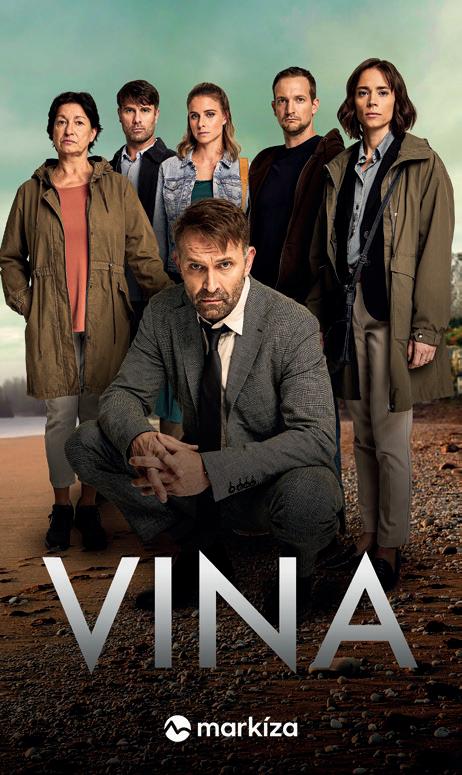
By Diego Alfagemez
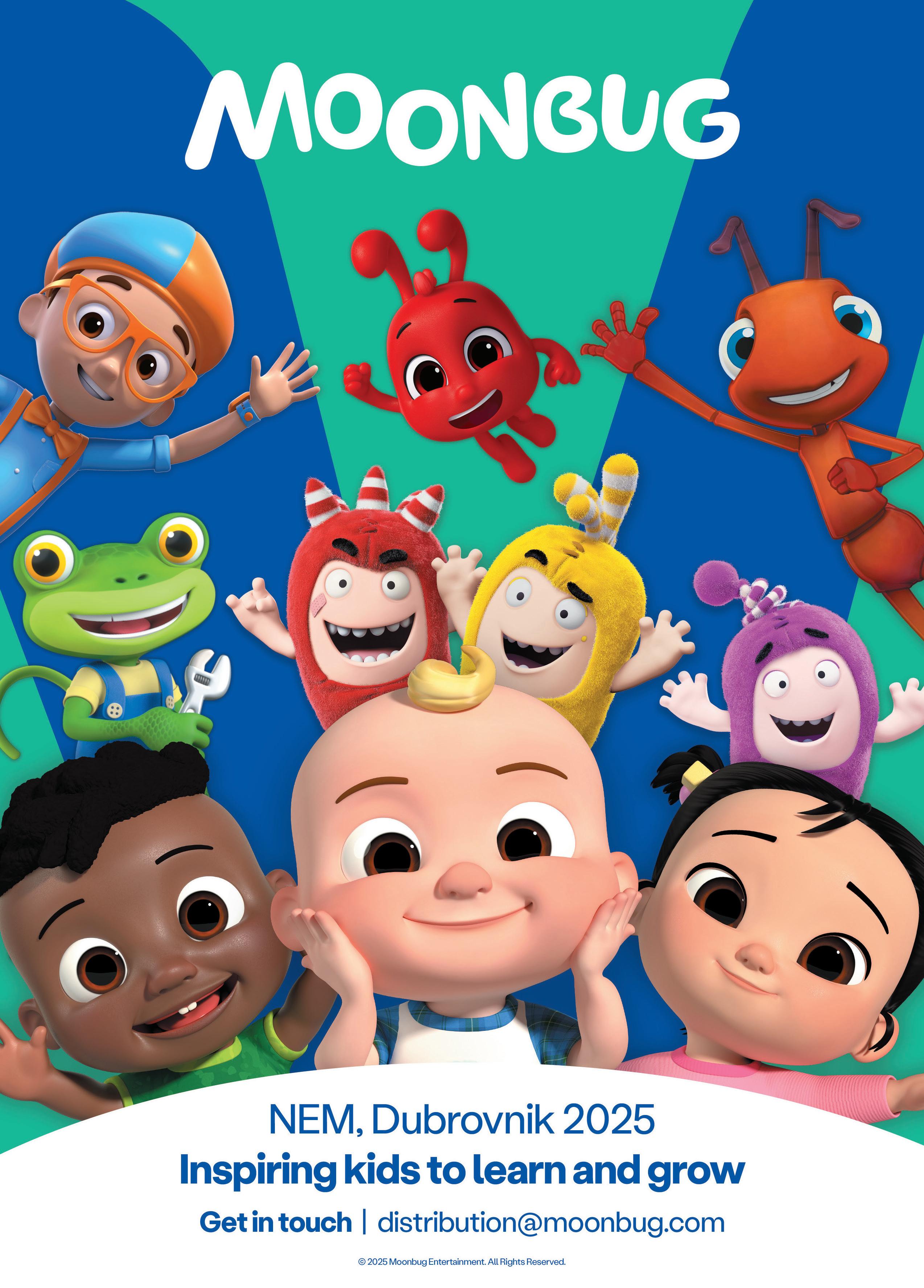
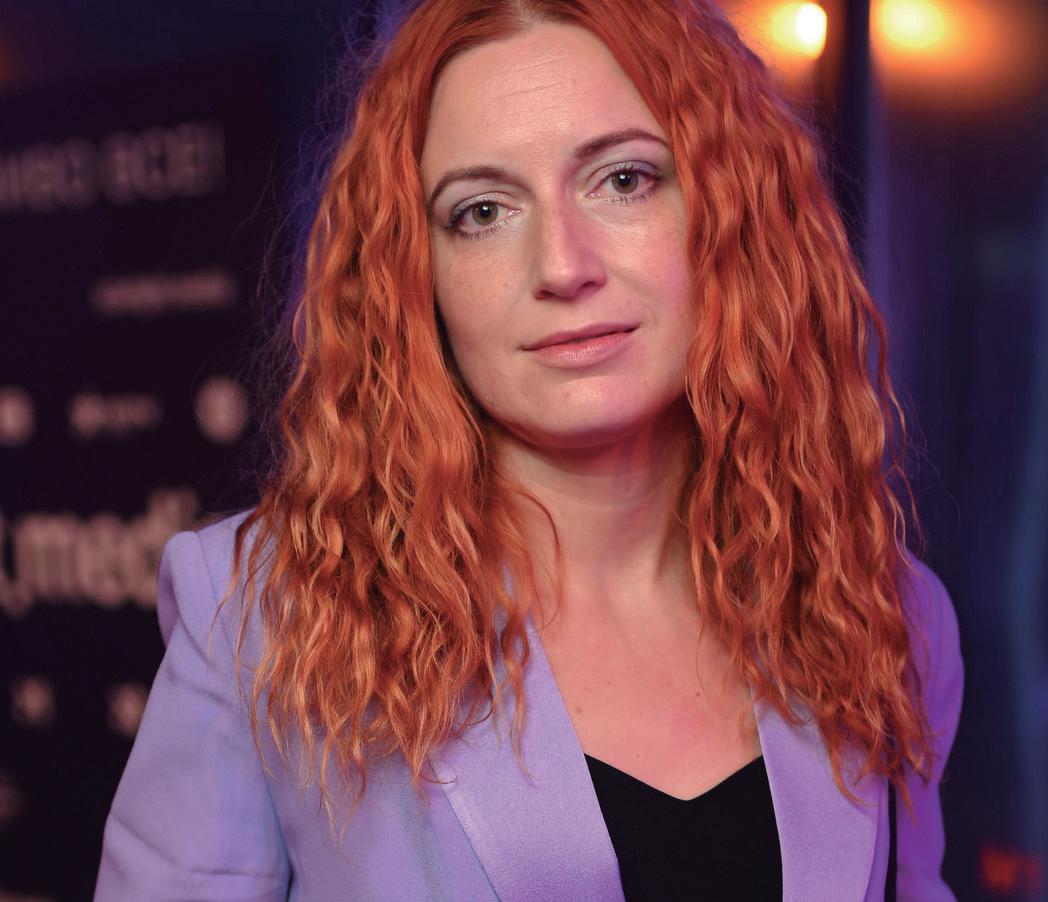
"THE
Love beats hate, and "The Bachelor Ukraine" is proof of that. Produced by Warner Bros. International and Starlight Media, the reality series sets a new precedent for the franchise, one that embraces resilience, inclusivity, and the realities of modern Ukraine. Showrunner Anna Kalyna spoke with Señal News about the challenges of filming under extreme risk and emphasized the need to spread love amid chaos.
What were the main challenges of producing a romantic reality show in the context of wartime Ukraine?
"Producing a show about love and roses in a country under constant air raid sirens, let's just say, wasn't exactly a fairytale backdrop. One of the biggest challenges was redefining what romance even means in today's Ukraine. For many women here, the ideal partner is no longer just charming, successful, or wealthy; it's someone who can protect, someone who's been through the fire and hasn't lost hope. That's why we chose a war veteran for the leading role. Logistically, we were filming with generator trucks because Kyiv had only a few hours of electricity per day for months. We couldn't shoot outdoors at night because of curfews, and drones were a no-go due to military restrictions. Emotionally, we had to strike a balance: how do you make a show about love without ignoring the war that's reshaping our lives? We leaned into authenticity, showing
both the strength and vulnerability of our participants, our Bachelor, and our country."
Why did you decide to produce the entire season in Ukraine despite the risks?
"It was never even a question for us. This season had to be filmed in Ukraine because it was our way of saying, 'We're still here.' We're still dating, laughing, and falling in love, even if our world has changed. We filmed everywhere, from the relatively quiet west of Ukraine to regions just 30–40 kilometers from the front lines. Why? Because that's where people are still living, loving, and surviving. Our audience had also changed; many women sought safety abroad, and those who stayed needed to see themselves reflected in the media. We brought the story to them. Believe me, when you're filming a dating scene, and the air raid alarm goes off mid-take, you remember exactly why this season matters."
What safety precautions were necessary during the production?
"Every location was chosen not only for its aesthetic appeal but also for its proximity to shelters and emergency response routes. We worked closely with local authorities and had emergency protocols in place for every shoot. In Kharkiv, a Russian bomb hit the very district we were filming in. It took us several grey hairs and a frantic 20 minutes to reach our team, who, by the way,
had resumed interviews as soon as the sirens fell silent. That's Ukraine today: chaos and commitment, side by side."
Why was Oleksandr Teren chosen for the leading role?
"Because he is the story we needed to tell. Oleksandr isn't just a veteran; he's a symbol of what it means to keep going when everything tells you to stop. He's lost both legs but gained an extraordinary life: Invictus Games medalist, author, ballet performer, and accessibility advocate. He has a quiet, magnetic strength that women and viewers immediately respond to. We announced Oleksandr as our Bachelor before we even started casting. Within 24 hours, our site crashed due to excessive traffic. Over 5,000 women applied, many of them trying to bypass the line through direct messaging. That's when we knew we had chosen right."
Do you believe this season could inspire changes in other international versions of The Bachelor franchise?
"I truly hope so. We didn't set out to 'break the mold' globally. We were telling a story that felt urgent and real in our context. The international response has been overwhelming. Oleksandr showed that a man with prosthetics can be sexy, romantic, confident, and very much the hero of a love story. This season proved that you can discuss war, resilience, and healing and still have steamy dates and roses. So yes, if this inspires even one other franchise to rethink what a 'Bachelor' looks like, then we've done something meaningful."
By Romina Rodríguez


DILEK DOYRAN, HEAD OF CHANNEL PARTNERSHIP, EMEA, AT MOONBUG, DESCRIBES HOW THE COMPANY’S BRANDS HELP CLIENTS AND PARENTS TO FIND RELIABLE, ENRICHING CONTENT THAT KIDS GENUINELY LOVE, AND THEY DRIVE CONSISTENT VIEWERSHIP.
In today's kids and family content and entertainment market, attention is hard to earn and even harder to keep. But two brands continue to do just that—day in, day out, around the world: "CoComelon" and "Blippi." These aren't just familiar faces to preschoolers; they're engines of loyalty, learning, and serious watch time. For broadcasters and pay TV platforms looking to stay relevant with families, they're essential.
Moonbug launched the "CoComelon Can Help" campaign to spotlight what fans already know: "CoComelon" isn't just entertainment; it's a tool for parents navigating the chaos of everyday life. Whether it's getting toddlers to brush their teeth, eat veggies, or wind down for bed, CoComelon supports the real rhythms of family life. "That connection is why 'Cocomelon's' viewing numbers are massive. 'CoComelon' was the most-viewed series on Netflix in 2023 and 2024,

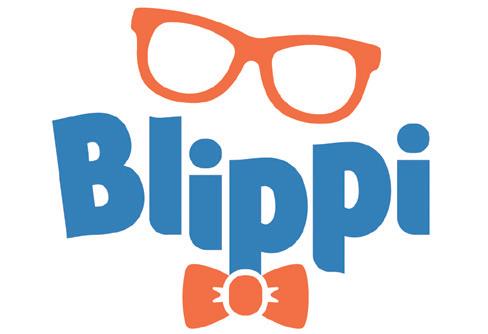
not just among kids' content but across all genres, according to Netflix's engagement data. On YouTube, the show continues to average 4 billion monthly views across more than 80 countries. Looking ahead, 'CoComelon's' first-ever feature film, backed by Dreamworks, will land in theaters in 2027, in an exciting new chapter for an already dominant brand," stated Dilek Doyran, Moonbug's Head of Channel Partnership, EMEA. Moreover, the company's 24/7 channels are expanding globally. "Co-viewing, content safety, global appeal—platforms want it all. That's why we built Moonbug's 24/7 linear channels, which are already available in nearly 100 countries and are growing rapidly across the APAC, Latam, and EMEA regions. Even in saturated European markets like the Nordics and the Netherlands, families are tuning in. These channels are designed to fit naturally into daily life, with programming built around routine, not just entertainment," Doyran added. For 24/7 channels, Moonbug offers two big brands: Moonbug Channel, in a trusted, everyday destination packed with

learning-led favorites like "CoComelon," "Little Angel," "Arpo," and more. The second one is the Blippi & Friends Channel, which was launched for Blippi's 10 th anniversary last year. "This channel brings his entire universe: Blippi Visits, Meekah, Blippi Wonders, and more—into a single place, alongside kid hits like 'Oddbods' and 'Supa Strikas,'" Doyran said.
"Blippi" content generates an average of 2 billion views per month on YouTube alone. Families trust him to make curiosity fun, whether it's a visit to a dinosaur museum, a tour of a recycling plant, or simply making a sandwich. Every day, Moonbug's channels help parents find reliable, enriching content that their kids genuinely love, and they drive consistent, sticky viewership among audiences.
"In a crowded space, 'CoComelon' and 'Blippi' don't just perform, they deliver. On a global scale, fresh formats, built-in fandom, and always-on engagement across linear channels, SVOD, and AVOD —whether you're building a family hub or refreshing your kids' slate —these brands are more than safe bets; they're must-haves. Now is the time to get in, grow with us, and bring families something they want to watch again and again," Doyran explained.
By Romina Rodriguez and Diego Alfagemez

MÜGE AKAR , HEAD OF SALES AT ATV, EXPLAINS THE COMPANY’S CONTENT ALIGNMENT STRATEGY AND HIGHLIGHTS WHY FLEXIBILITY IN LICENSING AND RIGHTS IS CRUCIAL AMID SHIFTING BUYER DEMANDS.
Turkish dramas remain a top export to Latin America, but evolving market conditions are shifting how distributors like ATV approach strategy, windowing, and flexibility. Müge Akar, Head of Sales at ATV Distribution, shares her view on demand trends, digital growth, and what makes Turkish content continue to resonate in the region.
What is ATV's current strategy in Latin America, and where do you see opportunities for growth?
"Right now, it's a challenging landscape, not just in Latin America, but globally. Still, we see room to grow. We're focused on placing the right title in the right slot on the right platform. Whether it's primetime, digital, or even rerun slots, our strategy is all about that alignment. We launched 'Nightfall' at Content Americas and showcased 'Hidden Destiny' at the LA Screenings. It's a strong story, very well received, and likely heading into a second season. Clients are responding positively. At the same time, we're preparing for the new season, which starts in September, and this is always an exciting point in the year".
You recently brought Fabiola Florez for Latin American sales. Does that express the value of the region's business?
"Yes, she joined three months ago. She brings extensive experience in the region and the industry, and now she's delving deeper into Turkish content. We'll make a great team together."
How do you analyze the content needs in Latin America in comparison with other global regions?
"Latin America is still very much into traditional Turkish dramas. Some buyers have experimented with other genres, but many are now returning to that classic Turkish drama style. That said, there are always case-by-case requests: some ask for rom-coms, and recently, a client inquired about Turkish films. Luckily, we

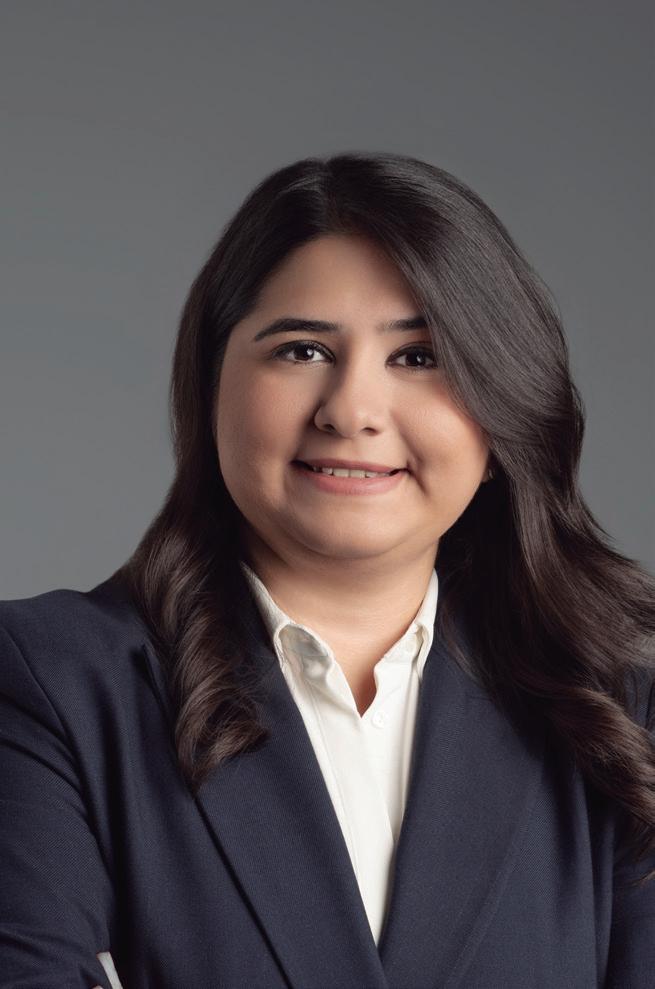
also have a movie production company, which is something we can offer as well. In

general, the demand for our core drama series remains strong."
With more digital platforms in the mix, has content windowing become more dynamic?
"Definitely. It has opened up new flexibility in how we license and structure rights, including exclusive, non-exclusive, and different windows. There are numerous platforms available today, making it challenging to keep track at times. What is encouraging is that nearly all of them recognize that the Turkish series is a must-have. There's genuine interest in exploring and expanding their Turkish content offerings."
How important is flexibility when working with global clients today?
"It's essential. The market shifts quickly; slots open and close, and priorities change. We need to be agile to follow those changes. Whether it is price terms or timelines, we do our best to stay responsive and supportive. Being flexible helps keep relationships strong and allows us to adapt to whatever the client needs."
By Diego Alfagemez
Last April, veteran executive Zsófia Szemerédy launched Leverage Point Entertainment, a boutique sustainability agency based in London and Budapest, designed to help creatives and companies discover their unique leverage point for change. In an interview with Señal News, she explains how the company gets its mission.
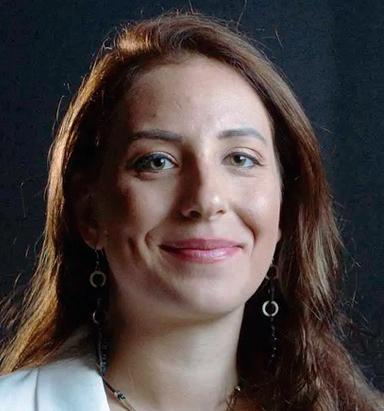
What is Leverage Point Entertainment's mission within the entertainment industry?
"Our mission is to help every player and stakeholder find their leverage point in the industry, where they can make the biggest impact with the least effort. Everyone likes to be efficient, especially in our industry. There are multiple constraints on each project, so everyone must find the lever that works for them. You'd be surprised by the impact a seemingly small decision can have. It's a ripple-effect game. We are here to create enough ripples so that we can influence the entire flow of the river, creating a powerful current towards a more sustainable outcome."
What are the key sustainability services LPE offers to productions?
"Some of the most important work starts before production. We aim to begin working with production companies early on to decarbonize their entire slate. It's all about long-term thinking. You want to identify the key areas for your production company. The next step is to set tangible goals, as not everything needs to be achieved in the first year. We support you with strategizing and implementation. On each project, we create a draft carbon footprint, implement a strategic decarbonization plan, manage the on-the-ground team as needed, and deliver a final evaluation report. It's also an 'all-you-can-eat' approach; it's up to you to choose what you need, whether that's the script report, training, or footprint assessment. It all depends on your goals. Every production is different, so there is no one-size-fits-all approach; however, there are guiding principles that apply to all. The most important one is: start thinking early on!"

ZSÓFIA SZEMERÉDY, FOUNDER OF LEVERAGE POINT ENTERTAINMENT, EXPLAINS THE CRUCIAL ROLE SUSTAINABILITY PLAYS IN THE CURRENT CONTENT PRODUCTION LANDSCAPE AND REVEALS THE BEST STRATEGIES THEY DESIGN FOR CREATIVES AND COMPANIES.
How does LPE help creatives embed environmental values directly into storytelling?
"The most important thing is to show the link between what is written on the page, what gets made by the production company, and what is ultimately seen by the audience. The production process has a physical impact, a carbon impact, which we calculate as the carbon footprint. The 'message' or 'story' will have a 'brainprint'. It's less quantitative, but it is proven that stories have
a greater influence on us than anything else. Therefore, seeing behaviors normalized on screen is extremely important. Whether that's shifting which character is vegan and who is not, for instance. An old stereotype is the 'vegan hippie.' We've all seen it on screen. We pose a question to the creative team: could a more credible character be vegan without changing the course of the story, thereby shifting the credibility and association with that choice? From small changes to larger ones, every detail matters. Whether it's normalizing behaviors like using recycling bins, showing posters about running on green energy or integrating more deliberate 'planet placement' moments, such as characters drinking from eco-brands or wearing clothing from responsible brands, it all adds up. Also, it's not a new trend. We are more vocal and conscious about it now. Films and TV series from my childhood already made throwaway mentions of climate change and sustainability. Our script reports are written with these considerations in mind."
How critical is funding to driving systemic, sustainable changes in content production?
"It is one of the most critical factors. Since pan-regional, regional, and domestic funding institutions and bodies introduced sustainability as a consideration and, in some cases, a requirement, awareness has increased tenfold. Let's be realistic: to make your film or TV show, you need funding. If that funding comes with conditions, you will certainly start paying more attention to the requirements. I encourage everyone to take a look at the Austrian 5% green bonus. It is a fantastic initiative and a true incentive, with minimum sustainability requirements set as a base."
By Romina Rodriguez



Herrera Correa (TVN), Miguel Garcia (ATRESMEDIA)
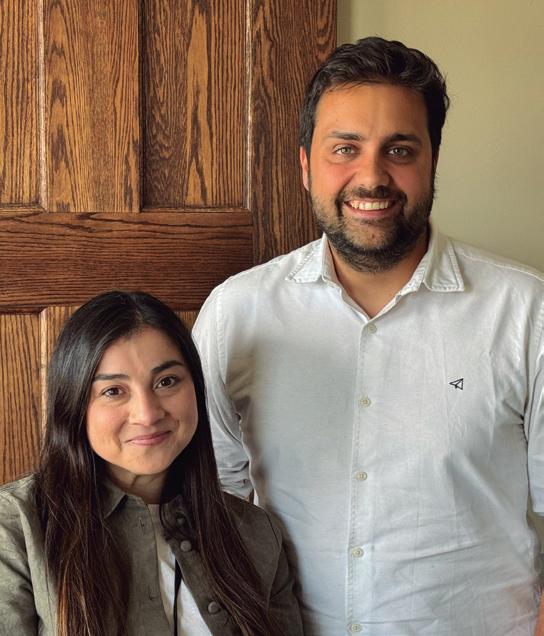

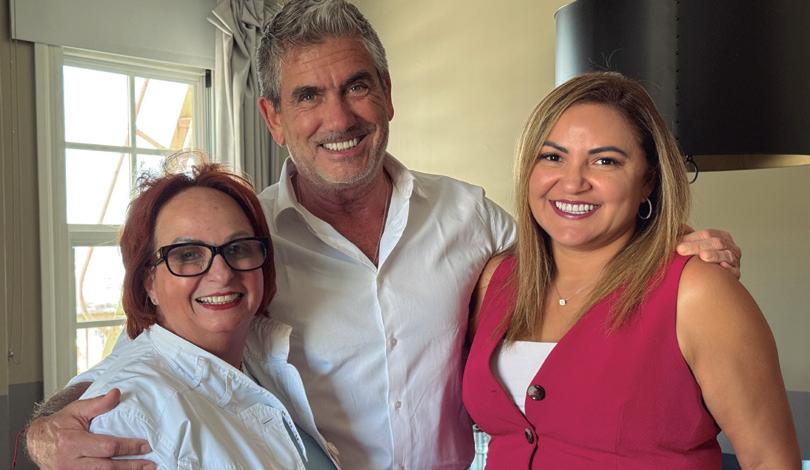

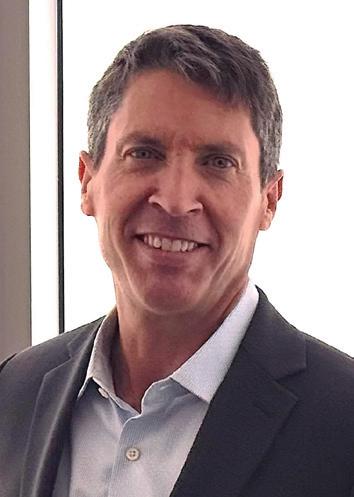
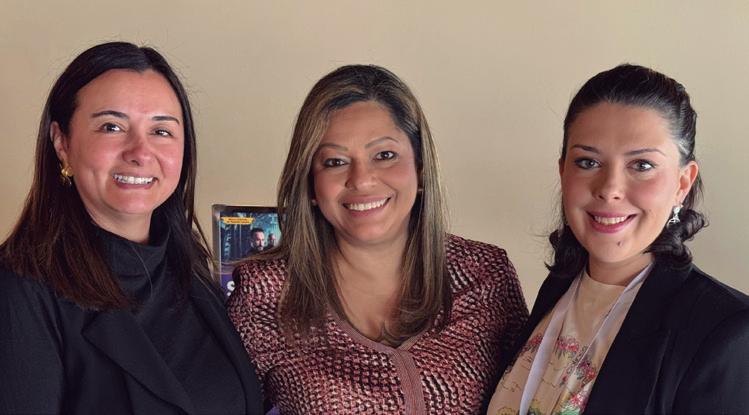
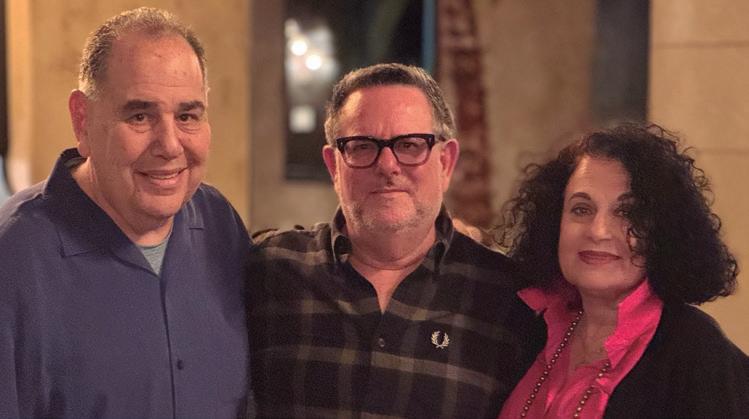



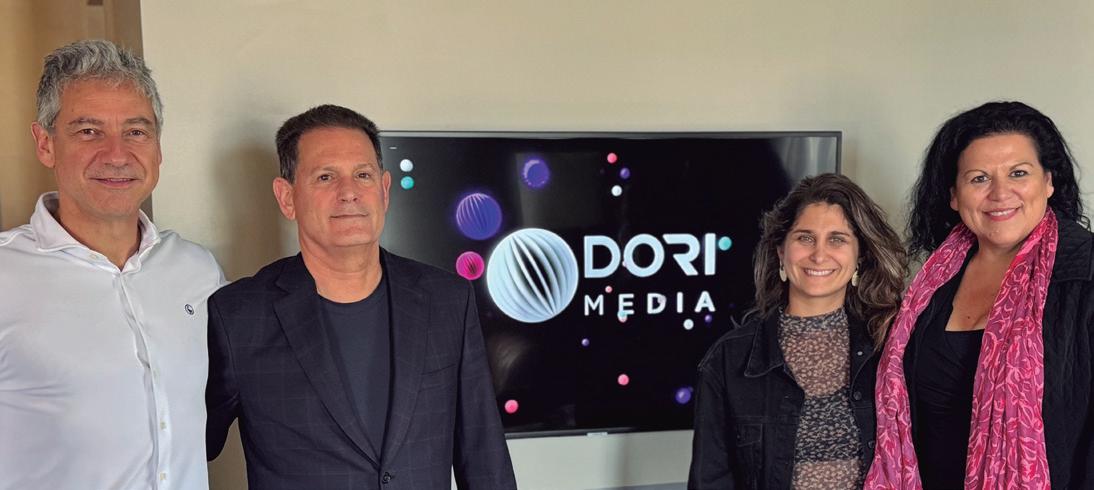


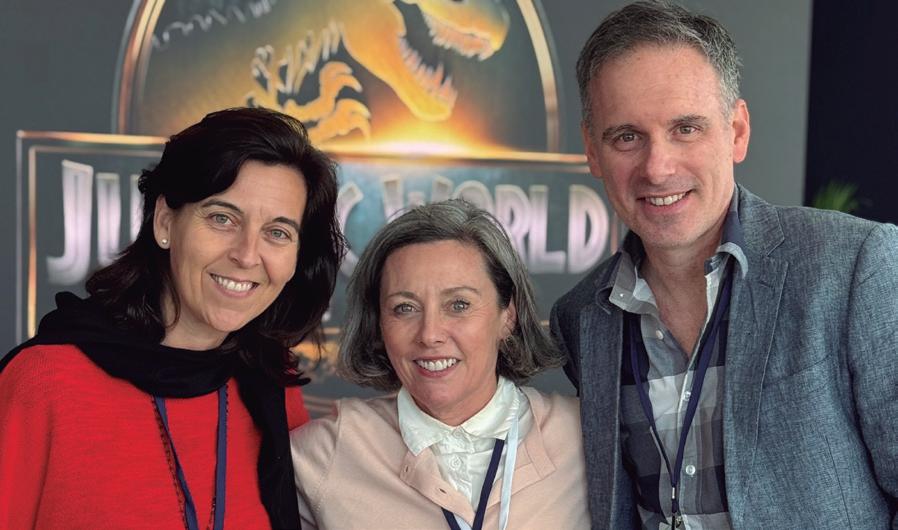
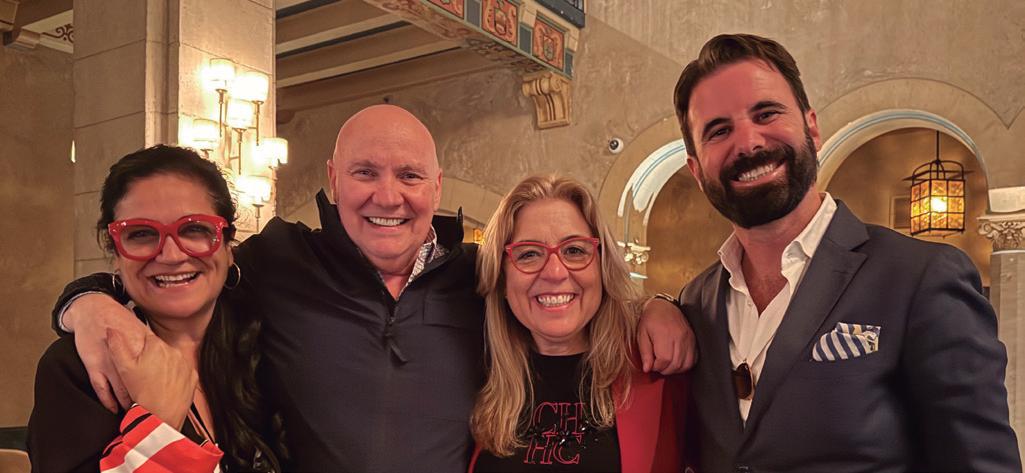
Cecilia Gómez de la Torre (CECI G), Erik Jurgensen (LATINA), Roxana Rotundo (VIP 2000), Ezequiel Olzanski (EO)
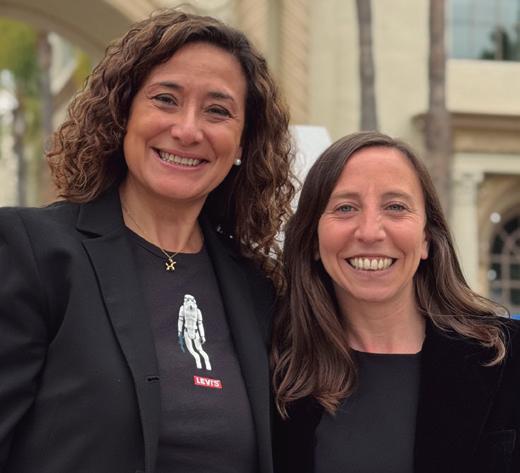

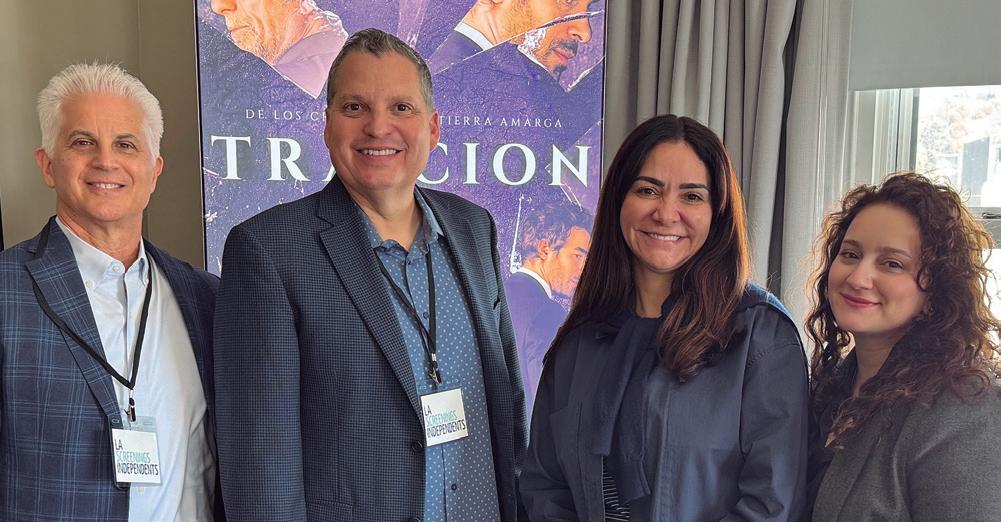



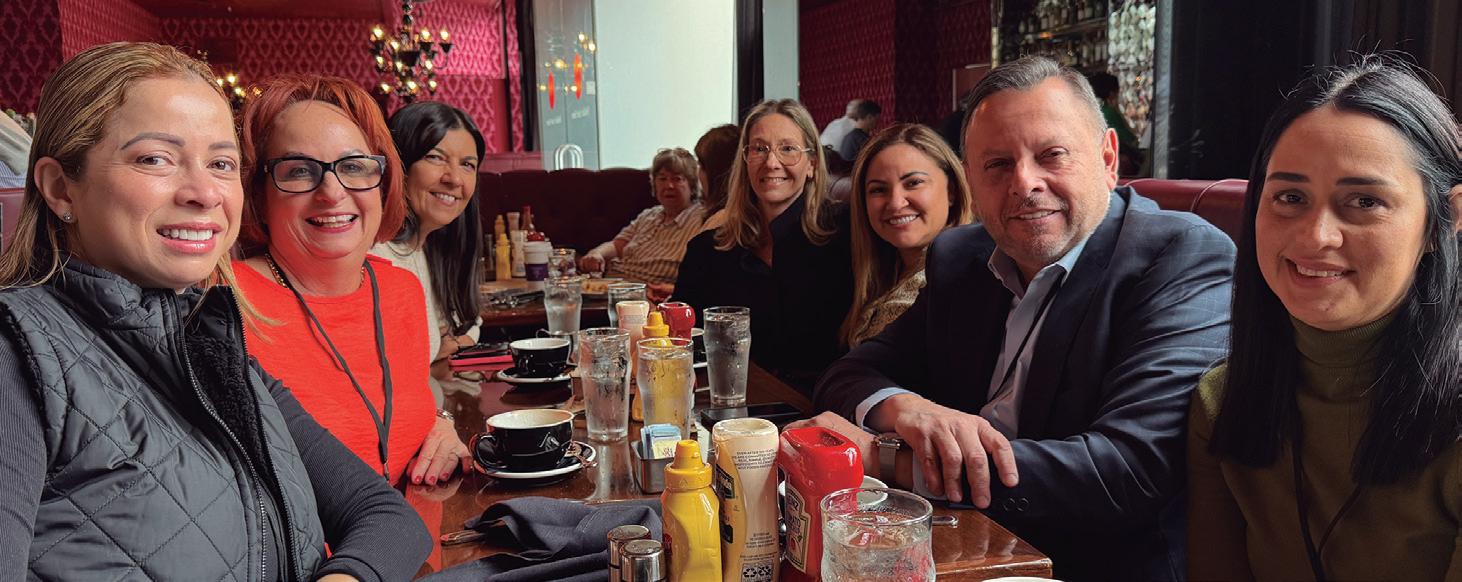
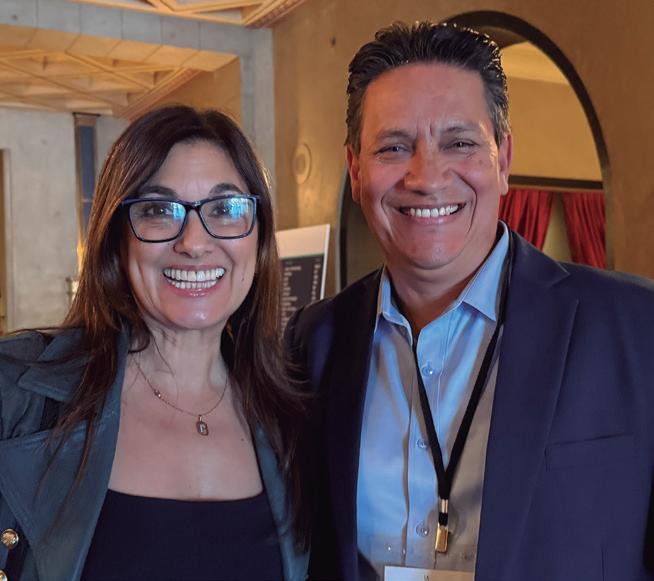


ATS AND NEST PRODUCTIONS HAVE SIGNED A DEVELOPMENT AND PRODUCTION DEAL TO STRENGTHEN PRODUCTION PARTNERSHIPS BETWEEN THE TWO COUNTRIES. DEREK DRENNAN, MD OF NEST PRODUCTIONS, AND SHAYNA WALDMAN, DEVELOPMENT & PRODUCTION EXECUTIVE AT ATS, SHARE MORE DETAILS ABOUT THIS STRATEGIC ALLIANCE.
US and UK-based production companies ATS and the UK's Nest Productions have formed a new transatlantic development and production partnership aimed at fostering collaboration and boosting entertainment production between the US and the UK. "There are so many synergies that it organically just made sense to create a partnership that leveraged our strengths and specialisms," stated Shayna Waldman, Development & Production Executive at ATS, who also added that ATS and Nest have extensive experience and knowledge of the US and UK production industries. "The foundations and philosophies of both our companies are completely in sync. We want to build strong transatlantic partnerships that companies can trust, providing a one-stop-shop solution to the changing landscape of the global industry," she said.
"Partnerships are the future and key to remaining successful in our industry," asserted Derek Drennan, MD at Nest Productions. "It's baked into our DNA; we have always wanted to provide the best infrastructure and production support for co-pro partners to make highquality content. In ATS, we see the same ethos; we've all seen the standard of production and set designs on the massive IPs ATS has worked on, from 'Ninja Warrior' to 'Celebrity Bear Hunt.' From the technical to the creative, we are perfectly aligned, which makes this an ideal match," he added.
The partnership between ATS and Nest Productions will leverage the strengths and offerings of the UK industry to US producers, including reduced costs for US productions shot in the UK and enhanced UK tax incentives. "We hope to facilitate UK/US productions that combine resources and open an ongoing transatlantic production flow," noted Waldman. "The UK and US have always had historically close ties in the types of shows people watch, whether that's taking Gordon Ramsay or 'Doctor Who' to the States, or bringing 'The Simpsons' and 'The Sopranos' to the UK. There is so much more that can be done between the
two countries, and there's huge opportunity over here for North American producers," Drennan asserted. He noted that in the UK, producers could reduce costs by more than 20% for US productions, offering lower price points for labor, kit, and crew; access to additional funding for large-scale projects filmed in Scotland through Nest's Scottish base, Nest Scotland; and enhanced UK tax incentives, including the new scripted tax credits. "With the potential of a UK Unscripted Tax Credit, we are actively championing the opportunities this could bring for entertainment shows. Extending this credit to unscripted productions in the UK could prove highly attractive for US entertainment projects," he said.
Derek Drennan emphasized that the initial focus of the partnership between the two companies will be on unscripted content, but "there's no reason why this wouldn't work for the scripted market," he said. "The cost savings, access to talent, and infrastructure are here and work across both genres. Coupled with the advantages of qualifying for local content quotas, there is plenty of scope for a wide range of IPs to be made here and commissioned either in the UK or the US. For the US industry, we want to provide a base for making massive formats with global appeal; it's what Americans do well, and we have the capacity to deliver," he explained. For Waldman, large-scale formats will benefit the most from this deal, as "this creates an opportunity for us to involve multiple territories and financial incentives, further reducing the overall cost for all parties," she noted.
Working with the UK can appeal to US distributors, streamers, and broadcasters, as it means they can have confidence that the money they invest is going toward a product that can be produced at a solid price point and is more likely to succeed in the international market. "This becomes more appealing due to the potential of bringing on a UK broadcast partner to help spread the costs, along with access to local funds like the ones we have in Scotland," said Drennan. "The UK offers access to some of the best talent in the industry, yet at significantly lower costs across the board when compared to the USA, and that's without even factoring in the potential UK Unscripted Tax Credit currently being campaigned for. There's also the benefit of a shared language and similar culture that make the entire process easier for all," concluded Waldman.
By Romina Rodriguez




